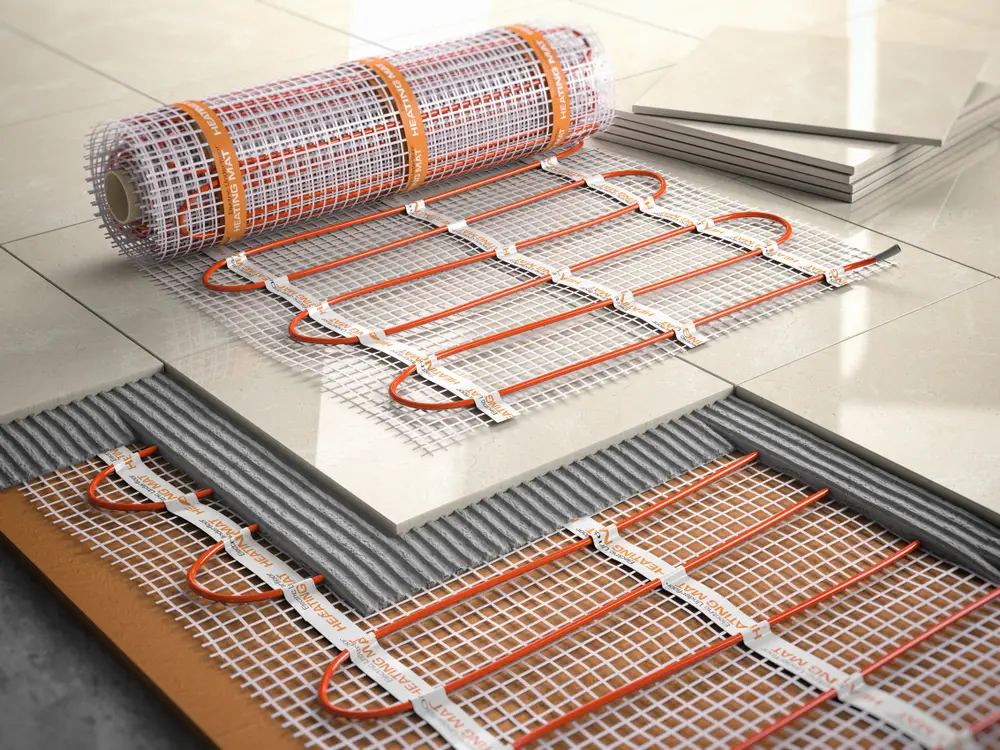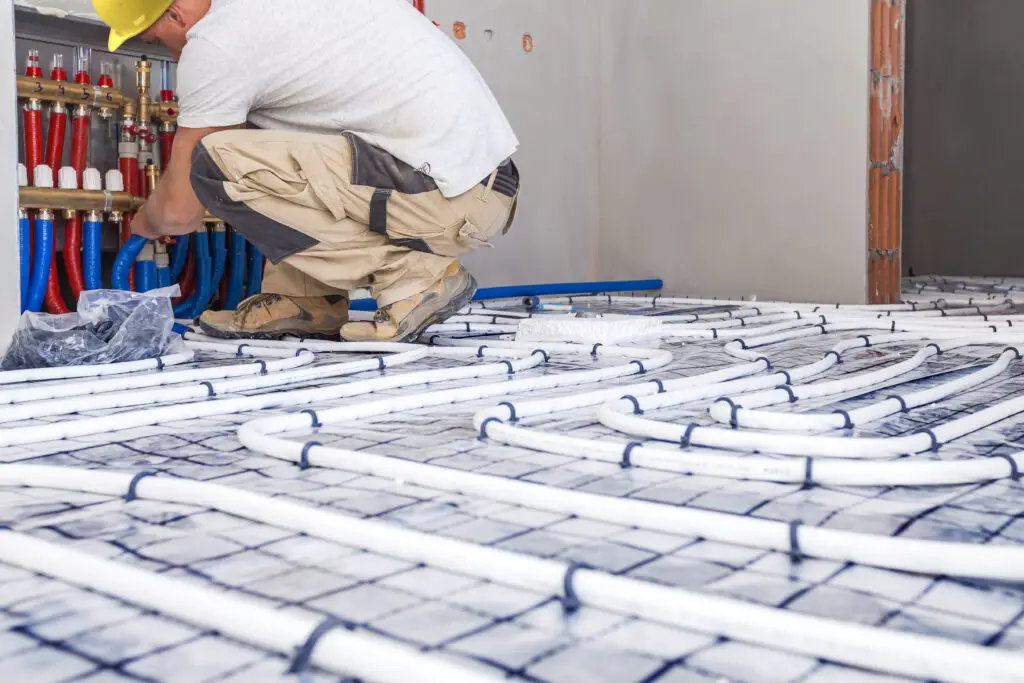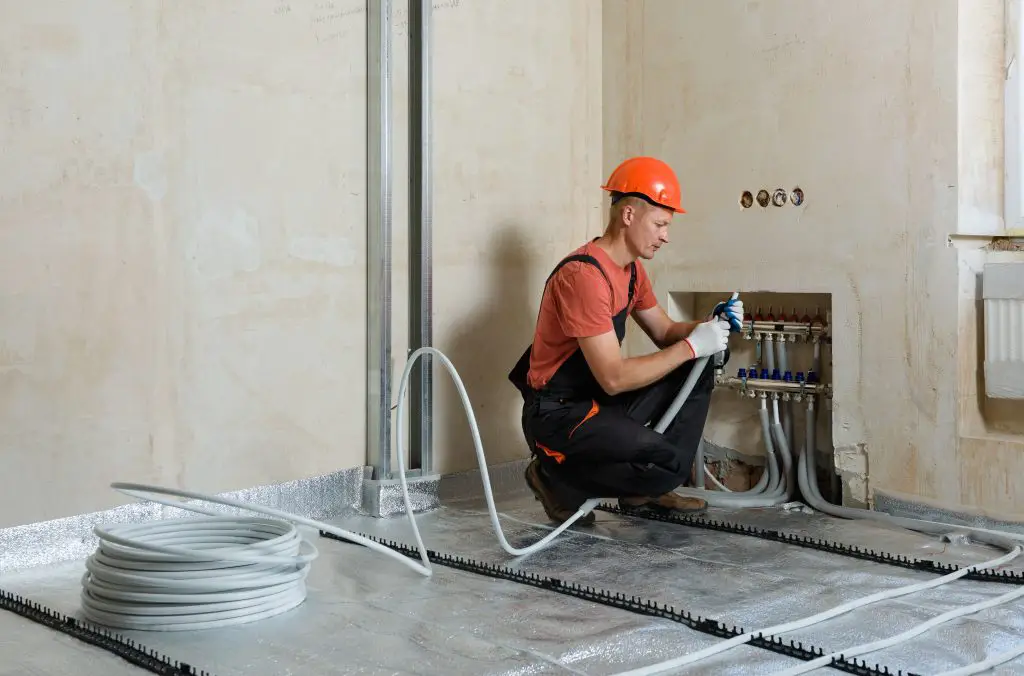When you make a change to your home, you want to know if that change will pay off in the long run with additional property value. Ideally you would like to know if you can recoup your investment when you come to sell your house. Underfloor heating is an attractive option that is highly likely to add value and make a home more attractive to potential buyers.
Underfloor heating is very likely to more valuable, memorable, and attractive to a range of buyers. However, you must weigh the cost of installation and running the underfloor heating, as well as the building’s energy efficiency, to decide if there is a good return on investment.

Does Underfloor Heating Add Property Value? – General Points to Consider
You should take into account the following points when weighing up adding underfloor heating to a property with the aim of increasing property value:
- Adding underfloor heating to older and less efficient homes is much more expensive than a fresh installation in a new build.
- In general, water-based underfloor heating systems are more expensive to install than electric systems.
- Water-based underfloor heating systems are much cheaper to run than electric systems once they are installed.
- The heat generated by an underfloor heating system can escape a poorly insulated room, so the addition of better insulation or draught exclusion can be a worthwhile investment at the same time as the installation of underfloor heating.
- There may be other forms of energy-saving and home heating that could add value to a property (eg Solar Panels).
Do heated floors add value to a house – Electric systems
In current times, underfloor heating systems are marketed as a luxury rather than a core essential means of warming a home. The benefits of warm feeling floors and cost-effective heat radiating throughout the home means underfloor heating is a very attractive selling point. I believe that underfloor heating would make a home memorable to those that view it and may be the deciding factor between two closely run properties.
Electric underfloor heating can be installed in older buildings relatively easily, which means older buildings can be fitted with these systems to boost market value. Yet, electric underfloor heating systems are more expensive to run than water-based systems.

So fitting this in cheap buildings and expecting a heavy return of investment is not recommended. However, in homes further up the ladder in the middle and higher ends of the market, underfloor heating can make all the difference.
Does underfloor heating add value to a house? – Water systems
Water Underfloor heating systems are more expensive to install, can raise the floors if installed in older buildings and there can also be problems with uneven floors if the flooring choice is not perfect. However, they are economical to run and provide even heating throughout the home. Plus, if these are fitted in new constructions, raised floors are not an issue.
The best thing about the water underfloor heating systems is that once it is installed, running costs are around one fourth that of an electric system of the same size. This attracts buyers who are on more of a strict budget.

How much Value does Underfloor heating add?
Electric systems are ideal for those with more disposable income because in addition to being more expensive to run than water systems, people who can afford it might prefer a lower environmental impact. It is usually considered that electric underfloor heating is more environmentally friendly, with lower carbon emissions than other forms of home heating.
Electric underfloor heating is often used to heat smaller spaces or individual rooms, such as a bathroom. Due to the associated running costs it is not often that electric underfloor heating would be used to heat an entire home. Check out this page from Nu-Heat showing you their ballpark prices for each type of underfloor heating.
Water Underfloor heating is recommended for new constructions as it has lower running costs and moderate income households can afford this luxury too. Water underfloor heating systems require pex pipes to be laid underneath the floor, this requires additional time and man power. Most old constructions don’t have the capacity to accommodate such extensive retrofitting.
It’s difficult to put an actual statistic on how much value would be added to a property based on an underfloor heating system. However, I would argue that underfloor heating is seen as a luxury and memorable addition to a home that will appeal to a wide range of buyers.
Those selling their home will likely see more interest in their property with underfloor heating, seeing more offers and the need to accept an amount under the asking price much more unlikely.

Does underfloor heating go upstairs?
Underfloor heating on the upper floors is more difficult as compared to ground floors because the ground floor can be properly insulated, and upper floors are difficult to insulate. This is why it costs more to heat the upper floors than to heat the lower floors.
Some realtors have opted to install a hybrid underfloor heating system for multiple floors. This gives then the option to make the most out of the situation. Electric Underfloor heating systems are installed in select upstairs rooms like bathrooms, and a water based underfloor heating is installed on the ground floor. This way, the running costs for an electric system are cut down and the difficulties associated with taking a water system upstairs are avoided.
One of the other benefits of underfloor heating is that the heat will radiate upwards and some of the heat from a downstairs installation will reach the upstairs rooms too.
Conclusion – Is Underfloor heating a good investment?
Underfloor heating can be expensive to install, especially in an existing property. It can be expensive to run, espeically if you’re using an electric system in a poorly insulated home.
However, underfloor heating systems are not a commodity but a luxury, and they are often billed that way as well. No matter what type of underfloor heating you opt for, it will likely bump up the overall house price, as well as appearing more attractive to a wider range of buyers.
But this varies from case to case, not all buildings with electric underfloor heating can be sold at a profit. This is a very thin line to walk, and the trends vary from city to city, and one answer may not fit in another situation.
It is a great thought to have that your investment in a lovely warm floor heating system will one day get repaid when you sell your home. You just have to factor in the costs of installation and then running the system for the period of time you continue to live in your home.

Lots more Underfloor Heating Information Here
- What Depth is Required for Underfloor Heating?
- Turning on Underfloor Heating for the First Time – How Long to Wait?
- Can you lay Vinyl flooring over underfloor heating?
- Do Tiles Crack With Underfloor Heating?
- Can You Heat a Whole House With Underfloor Heating?
- Can You Have Underfloor Heating Upstairs?
- Will Underfloor Heating Raise My Floor? – Underfloor Heating Layers Explained
- Can I put furniture on top of underfloor heating?
- How Do I Know If My Underfloor Heating is Leaking?
- Can You Combine Underfloor Heating With a Ground Source Heat Pump?
- Is Underfloor Heating Safe?
- Does Underfloor Heating Add Value to a Property?
- Can you have Wooden Floors with Underfloor Heating?
- Can Underfloor Heating Cause a Fire?
- What temperature should Underfloor Heating be set at?
- Can I Put a Rug Over Underfloor Heating?
- How Long Does it Take for Underfloor Heating to Warm Up?
- Why is my Underfloor Heating Noisy?
- Why is my Underfloor Heating Patchy?
- How do I know if My Underfloor Heating is Working? – Common Problems & Fixes
- What can go wrong with underfloor heating?
- Can you Combine Underfloor Heating with an Air Source Heat Pump?
- Do you keep underfloor heating on all the time?
- Does Underfloor Heating work with Smart Thermostats?
- Kitchen Underfloor Heating – Should Underfloor Heating go Under Kitchen Units?
- How much energy does Underfloor Heating use?
- Underfloor Heating in Summer and Winter
- Lifespan of Underfloor Heating
